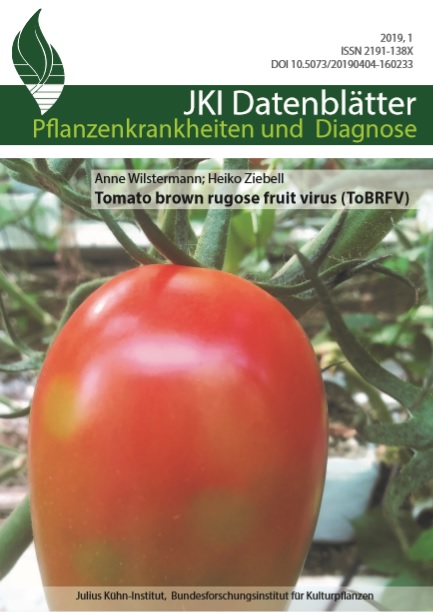TomBrownRugoseVirus (ToBRFV) disinfection with MENNO Florades - JKI Data Sheet
"Tomato brown rugose fruit virus (ToBRFV) was detected in Germany for the first time in 2018 and was classifi ed as quarantine pathogen. The virus is easily transmissible by mechanical means which can lead to rapid spread within greenhouses and/or production sites. Infected plant material should therefore be destroyed.
[..]
Host Plants Main host plants are cultivated tomatoes. ToBRFV can infect TMV or ToMV-resistant tomato varieties. ToBRFV can also infect tobamovirus-resistant pepper varieties (Luria et al. 2017). Other susceptible plant species can occur in nature in Germany, for example various goosefoot species (Chenopodium murale, C. quinoa, C. amaranticolor), petunia (Petunia hybrida; an important ornamental crop), and black nightshade (Solanum nigra). Experimental host plants include diff erent Nicotiana species (Luria et al. 2017). Potato (Solanum tuberosum) and eggplant (Solanum melongena) appear to be not susceptible (Luria et al. 2017).
[..]
Prevention and Control
Strict hygiene protocols are the most important step in the prevention of tobamovirus infections. All plants need to be inspected regularly. If suspicious symptoms are observed, abiotic stress (nutrient deficiency, temperature) and pests should be ruled out. If a virus infection is suspected, the appropriate local plant protection organisation should be notified for virus testing. If ToBRFV infection is confirmed, all plant material should be destroyed (incineration) and not be composted as the virus particle can survive this process (Richter et al. 2019). There is currently no information available on the decontamination of greenhouse substrates. It is therefore recommended not to re-use contaminated substrates (such as rock wool or perlite) (Richter et al. 2019). There is a great danger of crosscontamination if the same crops or alternative hosts to ToBRFV are grown afterwards. Heat or steam treatment may reduce the risk of infection but do not guarantee that the materials are free from virus particles afterwards.
Floor space, boxes, containers, tools and utensils should be disinfected using licensed products. The use of licensed products guaranties proven efficacy whilst preventing negative effects on operators, plants and environment. In Germany, only Menno Florades® is currently licensed as antiviral agent (Bundesamt für Verbraucherschutz und Lebensmittelsicherheit 2019). The manufacturer provides details on concentration and exposure time for successful inactivation of viruses. Unlicensed products are not recommended as they have not been tested for efficacy and harmlessness for humans, animals and the environment."
Source: JKI Data Sheets Plant Diseases and Diagnosis, Anne Wilstermann; Heiko Ziebell, Tomato brown rugose fruit virus (ToBRFV), 2019, 1 ISSN 2191-1398 DOI 10.5073/20190607-160917
More information please find by cklick on the pic of the data sheet above (Link).
Legal national registration requirements and legislation has to be considered before and during use.
NEWS
GreenTech in Amsterdam vom 11. bis 13. Juni 2024
We are looking forward to welcome you this year at GreenTech Amsterdam at our booth 02.106 and to...
more
41. BbT Veterinärkongress vom 21.-23.04.2024
Anlässlich des Internationalen Tierärztekongresses in Bad Staffelstein ist MENNO vor Ort Aussteller...
more 16.04.24
ANUGA Foodtec Köln 19. - 22.03.2024 - MENNNO is exhibitor
We hope to see you at our both in hall 5.2 D061 at the ANUGA Foodtec in Köln. We will be able to...
more
Personalhygiene von Anfang an mitdenken - Gemüse 01-2024
Reinigungs- und Desinfektionsmaßnahmen gegen ToBRFV Der Mensch trägt maßgeblich zur Verbreitung...
more 1.02.24
Fruit Logistica 2024 in Berlin
We hope to see you at our booth in hall 2.1 D30 at the Fruit Logisctica in Berlin. We will be...
more


